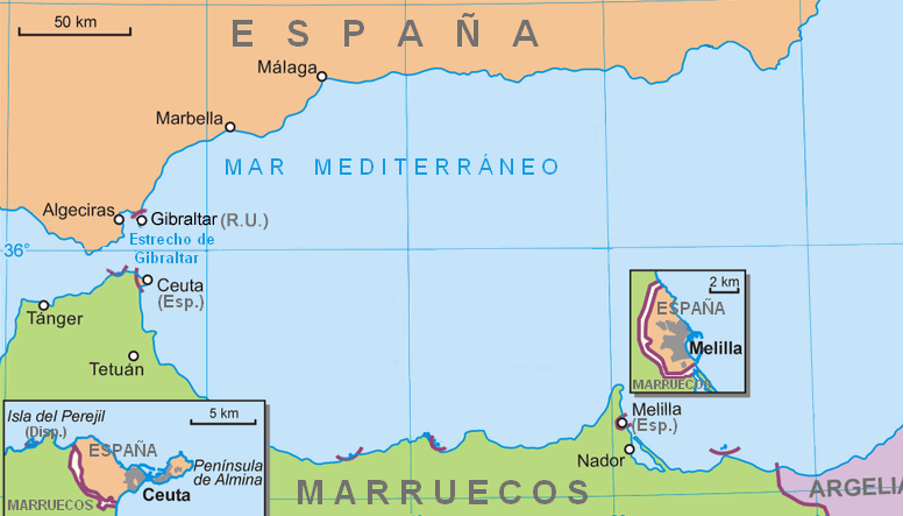
Ceuta and Melilla- or “occupied “Sebtah and Melilah” as they are referred to in Morocco- lie on the coast of North Africa. Connected by land to Morocco and some 500km from Madrid, you would be forgiven for not knowing that these cities are so-called Spanish enclaves, and seen by the Spanish government as an invaluable part of their state. These two cities provide the only land borders between the African continent and the EU, but there has been a long history of conflict over who is their rightful owner, a story which persists in the present. Spain has faced renewed accusations of colonialism in the post-colonial era, with many believing they are attempting to cling onto the remains of a great empire which they have long lost. However, Spain maintains that Ceuta and Melilla form an integral part of the structure of their state, with the two cities categorised as autonomous cities within the Spanish devolution system. Spain also argues that Melilla and Ceuta have a long history as part of Spain, so that Morocco has no real ownership claim.
Looking back at the long history that Melilla and Ceuta have endured, it appears typical of those from the period of extensive empires and persistent colonialism. In the 8th century it was used as a “launchpad for Moorish conquest of Iberian peninsula”, but then Melilla was conquered by Spain in the 15th century. Later, Ceuta fell also, both becoming part of Spain as a result of the military campaign to remove all Muslim influence from the peninsula. Since this time, the two cities have been part of the Spanish empire, and then subsequently the Spanish state, when the country clung onto Ceuta and Melilla once Morocco became an independent country. The wave of decolonisation passed across the globe, but Spain gripped tightly onto their two cities in North Africa.
Little progress has been made over resolving the contested ownership of Ceuta and Melilla. Spain argues that their reign over the cities predates their rule over some of its regions on the mainland, and therefore is extremely resistant to giving up territory that they believe to be rightly their own. Morocco itself has intended to contest Spain’s ownership of Ceuta and Melilla, but a small technicality means that the country is powerless. Due to the cities being conquered during the Reconquista, they were never recognised as “a vestige of colonialism”. This meant that when the time came for Spain to relinquish its colonial territory, Ceuta and Melilla remained due to being legally classified as part of Spain.
Morocco has attempted to regain what it feels are its lost cities, but it is not easy. Spain’s outright refusal to engage in conversation over the future of Ceuta and Melilla makes it almost impossible for any discussion to be had. From the perspective of the Spanish state, even entering into a conversation about Morocco’s supposed claim to the land would undermine their stance that the two cities are uncontestably theirs and have been even before Spain took on its current form.
However, it is easy to doubt the sincerity of Spain’s claim of how they view Melilla and Ceuta as invaluable parts of their country. Given where they are situated, it is easy to see that they have another motive to keep hold of the territory. The Spanish government may fondly hold Ceuta and Melilla in their hearts as they do the rest of their autonomous communities, but it is more likely that the strategic importance of Ceuta and Melilla is the main motivator. They provide them with a border to the African continent, and Ceuta is situated helpfully near to the Straits of Gibraltar (which is British territory within Spain). It is not also apparent that the Spanish government provides the same support to Ceuta and Melilla as the autonomous communities found within the Iberian Peninsula itself. It is understandable that the same amount of infrastructure projects cannot be supplied to a city of around 85,000 as to a region like Andalusia which has a population of nearly 8.5 million people. However, the difference between the resources supplied to Ceuta and Melilla compared to the rest of Spain is quite dramatic. Between 2019-2021, Ceuta recorded two foreign direct investment project, and Melilla just one. They also both are the most socio-economically deprived regions in Spain, with “the lowest levels of GDP per capita, as well as the highest levels of unemployment” . The government have attempted to rectify this, and despite the two cities being categorised as ‘semi-autonomous’, the central government have investigated more money and resources into improving the quality of life there. However, this data does undermine this idea of an emotional tie between the Spain and the two cities, and the argument that Ceuta and Melilla are treated the same as the rest of the Spanish regions.
Therefore, despite on the surface this case seeming a clear example of European colonialism which has for some reason managed to survive until now, the situation is not clear cut. Morocco has a fair reason for wanting to regain what they feel is rightfully their own, as it was drastically snatched from them. However, without Spain even willing to recognise that Morocco may have some claim to the land, it is difficult for progress to be made. What makes Morocco’s case even more difficult to fight is that the populations within Ceuta and Melilla wish to remain part of Spain. This means that for the territory to be reincorporated into Morocco, either the people within it must experience a significant change of heart, or they would have to be unified with the rest of Morocco against their wills (something that would be both extremely unethical and politically suicidal for Morocco).



Average Rating